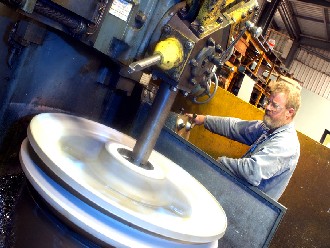Industry Organisation Publishes 'Manufacturing Manifesto'
EEF, the manufacturers’ organisation has published its manifesto for manufacturing. ‘Manufacturing Our Future’ sets out a vision for manufacturing at the centre of a more diverse and durable UK economy and makes bold recommendations to back it including a National Economic Council charged with delivering it and a new Industrial Bank .

There are glimmers of recognition from across the political spectrum that action is needed to equip the UK to meet the strategic challenges that lie ahead and put the economy on a more sustainable path. But we are not there yet. EEF’s strategy for a more diverse, agile and innovative manufacturing sector speaks to both manufacturers and government. It plots a course for a stronger and relatively larger manufacturing base which could provide the solutions to future challenges and help the UK pay its way in the world.
The growth of sectors such as aerospace; medical equipment and energy will be vital if the UK is to provide the solutions to climate change, demographic shifts and future security needs with domestic manufacturing capacity.
Commenting, EEF Chief Executive, Gilbert Toppin, said: "Manufacturing must play a bigger role in our economy if we are to meet the challenges facing us over the next decade. It can be a major player in addressing climate change and meeting our demographic and security challenges as well as helping to claw back the twin deficits in the public sector and on trade.
But this will only happen if our manufacturers show the ambition and make the investments needed to achieve this and the government sets out a framework that gives them the confidence to do it. In particular, the government must set out its priorities for the technologies and markets we need to develop and the steps it will take to help the UK succeed in them."
We will only deliver the type of economy we need and one that will be well placed to benefit from a world economy that will double in size in the next 20 years with a clear framework for action. EEF sets out the guiding principles which will ensure the UK rebalances its economy and responds to strategic challenges as they emerge on the horizon.
1. Send signals: Companies entering new and developing markets need a clear signal about the government’s long term priorities. Only then will manufacturers’ have the confidence to invest. Government must signal the importance that government attached to specific technologies, markets or investments and the steps it will take to help them succeed
2. Overcome obstacles: government must work with business to identify and overcome obstacles to the growth of new and developing markets, for example skills shortages, infrastructure requirements or bottlenecks in the planning system.
3. Collaborative customer: Government is a major customer for business. Its £175 billion budget offers significant purchasing power in new and emerging markets if deployed effectively. But government must engage more closely with industry to convey its needs and support innovation in these areas. This will require significant culture change if the public sector is to focus on long-term value for the economy rather than short-term cost savings.
4. Target investment: Government invests in markets directly and also in areas such as skills and innovation that support these markets. With the squeeze on public spending set to tighten, the government must be bold and strategic in its investment decisions. This approach will require government to become better at balancing risk and outlining its decisions against a set of clearly understood criteria.
By adopting this framework government will utilise its influence in markets more effectively and use it to deliver a dynamic, diverse and forward looking economy. But this has to be backed with tangible policies and resources, including:
- A re-established Industrial Bank tasked with investing in the future.
- A £1billion innovation ‘X prize’ for the commercialisation of low carbon technologies.
- More strategic use of procurement in new and emerging industries.
- Progress on improving the business environment, specifically on the tax system, regulatory burden and skills infrastructure.
- A more coordinated approach to expert guidance on economic challenges and responses through the National Economic Council.